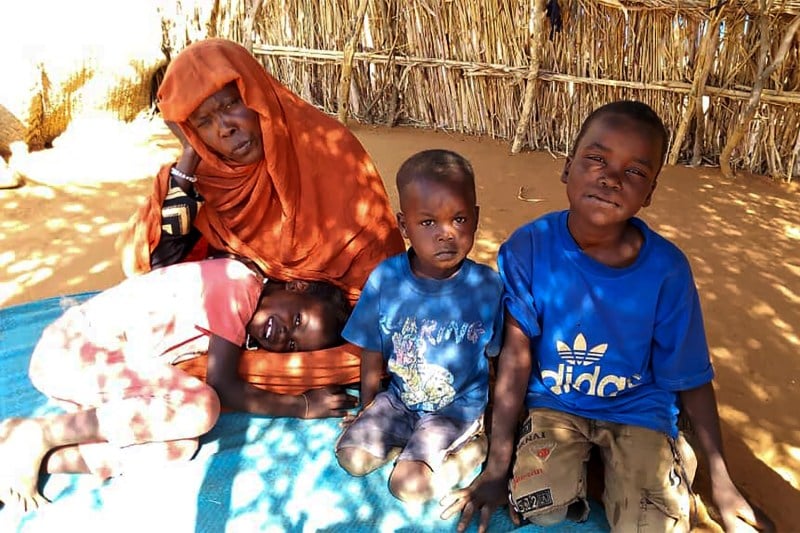Top Stories
UAE Blocks Aid to Sudan as El Fasher Faces Catastrophic Siege

UPDATE: The United Arab Emirates (UAE) is facing intense scrutiny for obstructing international efforts to end the devastating siege in El Fasher, Sudan, which has left 400,000 civilians trapped in dire conditions. As the humanitarian crisis deepens, the UAE’s role in backing the Rapid Support Forces (RSF) has emerged as a critical barrier to peace.
Reports indicate that for the past 29 months, the conflict between the Sudanese Armed Forces (SAF) and the RSF has escalated into what the United Nations describes as the world’s worst humanitarian crisis. El Fasher, the capital of North Darfur, has been under brutal siege for 18 months, with humanitarian aid continuously thwarted by drone strikes. Notably, at the recent U.N. General Assembly, no leaders addressed the horrific situation in El Fasher, emphasizing the urgency of the crisis.
Sources confirm that the UAE, a key player in the conflict, was the only member of the Quad mediation group to block an agreement to end the siege. The UAE has denied allegations of supplying arms to the RSF, despite documented evidence of a significant influx of weapons coinciding with an increase in violence in El Fasher.
The implications of the RSF’s control are catastrophic. If the RSF gains access to El Fasher, experts warn of potential mass killings targeting vulnerable non-Arab communities, already suffering from famine. The situation is further compounded by a report from the Raoul Wallenberg Centre for Human Rights (RWCHR), which concluded that the RSF is committing genocide against non-Arab communities, particularly the Masalit tribe.
Survivors of RSF attacks have recounted harrowing experiences. One survivor noted, “If you were Masalit, we decided that we don’t want to leave any alive, not even the children.” In April 2023, the RSF stormed Sudan’s largest displacement camp, resulting in over 1,500 deaths and the forced displacement of more than 400,000 people.
The RSF’s strategy has involved systematic dehumanization and targeting of ethnic minorities, with chilling orders to “wipe out” entire populations. Recent evidence includes a video showing an RSF commander executing a civilian identified as belonging to the Berti tribe, underscoring the urgent need for international intervention.
Despite the U.N. Security Council’s calls for a cease-fire, no meaningful actions have been taken. The solution appears straightforward: confront the UAE, which has become integral to the RSF’s operations. Reports reveal that the UAE is supplying arms through a network of cargo flights, reinforcing the RSF’s capabilities.
Moreover, the UAE’s involvement is not limited to arms; it has exploited the conflict for access to Sudan’s vast resources, including gold. Over the past decade, the UAE has imported approximately $115 billion worth of undeclared gold from Africa, raising serious ethical concerns about its role in Sudan.
Critics argue that the UAE’s narrative of combating political Islam in Sudan is a façade, as the RSF was initially created by Islamist factions. The UAE’s leaders have maintained close ties with RSF commander Mohamed Hamdan Dagalo, known as Hemeti, using him as a proxy to further their interests in the region.
As the situation in El Fasher grows increasingly desperate, the UAE must be held accountable. If the UAE truly aims to support the victims of this war, it should demand the RSF withdraw from El Fasher, which would offer immediate relief to the trapped civilians.
With nearly half a million lives at stake, the international community must act swiftly to address this unfolding tragedy. The humanitarian crisis in Sudan cannot be ignored any longer; urgent action is imperative.
-

 Science4 weeks ago
Science4 weeks agoALMA Discovers Companion Orbiting Giant Red Star π 1 Gruis
-

 Politics2 months ago
Politics2 months agoSEVENTEEN’s Mingyu Faces Backlash Over Alcohol Incident at Concert
-

 Top Stories2 months ago
Top Stories2 months agoNew ‘Star Trek: Voyager’ Game Demo Released, Players Test Limits
-

 World2 months ago
World2 months agoGlobal Air Forces Ranked by Annual Defense Budgets in 2025
-

 World2 months ago
World2 months agoElectrification Challenges Demand Advanced Multiphysics Modeling
-

 World2 months ago
World2 months agoMass Production of F-35 Fighter Jet Drives Down Costs
-

 Business2 months ago
Business2 months agoGold Investment Surge: Top Mutual Funds and ETF Alternatives
-

 Science2 months ago
Science2 months agoTime Crystals Revolutionize Quantum Computing Potential
-

 Top Stories2 months ago
Top Stories2 months agoDirecTV to Launch AI-Driven Ads with User Likenesses in 2026
-

 Entertainment2 months ago
Entertainment2 months agoFreeport Art Gallery Transforms Waste into Creative Masterpieces
-

 Business2 months ago
Business2 months agoUS Government Denies Coal Lease Bid, Impacting Industry Revival Efforts
-

 Health2 months ago
Health2 months agoGavin Newsom Critiques Trump’s Health and National Guard Plans









